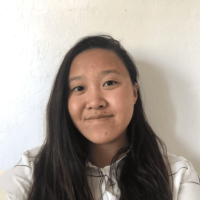
Alys Chang
Hometown, Fullerton, CA
Throughout my life, I thought about my identity very much. I grew up in a diverse environment in good ol’ Silicon Valley, California. But as diverse as it was, I never really felt entirely accepted. I was always playing sports as a little girl with the boys while the other girls sat around and just talked to each other. I did swimming and got extremely tan, while other kids went home or went on actual vacations. I didn’t go to church like other Korean kids in my area. I didn’t speak Korean like the other Korean kids who could. I didn’t have straight A’s like the other Korean kids. I was outspoken, loud, and always wanted to do something. My dad knew that I didn’t really understand my identity. He knew that I was like the other Korean kids, but, because of the way I look, I wouldn’t be considered American at first glance. So what did he do? Day in and day out he would remind me that I am a Chang from Sunnyvale, California and I am a Korean American. So despite the lack of community, I felt from others, I at least had my dad reassuring me that it is okay to be Korean American. But eventually, I lost him. My dad passed away when I was 13 years old. He was the only person that reinforced my identity and its importance. But when he was gone, the ability to accept me disappeared like him. Throughout high school, I ended up burying my identity. I put up walls around me and a hard persona, so no one questioned who I was because I was stern and convincing enough to others that I already knew who I was. But I didn’t.
NCLC changed that.
When I was applying to NCLC, I honestly had no idea what I was going to be signing up for. I knew that I was signing up to meet and listen to Korean Americans in the real world, but I didn’t think I was going to have to face the thing that I buried years ago. NCLC was truly a life-changing experience. Not only did I get to talk to Korean Americans in different professions, but I was given the opportunity to open up my identity. It was the first time in 5 years that I felt like myself. I felt like a Korean American. All of the speakers, peers, and counselors had a lot of the same experiences as I did growing up in Korea, which was very comforting. As the week progressed, the acceptance of my Korean American identity began to open itself up. I remember breaking down on reflection day about my struggles with my trauma and self-hatred throughout my life because I was Korean American. I never experienced anything like it and I do not regret it.














